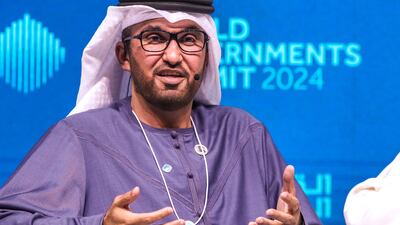The UAE Cop28 presidency has launched a major partnership with the next two hosts of the climate conference, Azerbaijan and Brazil, to help keep the crucial 1.5ºC climate goal within reach.
The “Cop presidencies troika” aims to boost co-operation and ensure continuity between the hosts of the annual climate talks in what is being called "mission 1.5ºC".
Announced on Monday, the “troika” aims to keep the spirit of the Dubai 2023 deal alive and ensure the world escapes the worst of global warming.
It came as the World Governments Summit on Monday heard from Cop28 President Dr Sultan Al Jaber and the incoming head of Cop29 at Baku about lessons learnt and the path ahead.
Cop28 President
“Cop28 delivered a different, ground-breaking Cop that culminated in the UAE Consensus,” said Dr Al Jaber, who is also Minister of Industry and Advanced Technology.
“The troika helps ensure we have the collaboration and continuity required to keep the North Star of 1.5°C in sight – from Baku to Belem and beyond.”
The Cop28 deal was formally referred to as the global stocktake, under which countries were called on to “transition away” from fossil fuels in what was arguably the most significant step forward for global climate action since the 2015 Paris Agreement.
It seeks to keep the global temperature limit of 1.5°C, agreed on at Paris, within reach and avoid the worst effects of climate change.
If global temperatures rise by more than that, the lives and health of billions of people could be endangered, scientists believe.
“We will be working together through the Cop presidencies troika, with our friends in Baku and Brazil, to ensure that promises made in Dubai are fulfilled through closer, focused partnerships and credible support to enable delivery,” said Dr Al Jaber.
The message from Cop28, however, was also that collectively the world was still not on track to keep temperatures from rising by 1.5ºC above pre-industrial levels amid repeated UN warnings that the planet could be headed for warming of 3ºC.
That is where the troika comes in, to drive momentum over successive Cops.
Cop29 in Baku is expected to focus on finance and how to help get funds to those who need it most on the front lines of climate change. Desertification and drought is also set to be on the agenda.
At Cop30 in Brazil, countries will come with fresh national climate-action plans, known as nationally determined contributions (NDCs).
Cop29 president-designate Mukhtar Babayev, also Azerbaijan’s Minister for Ecology and Natural Resources, said it was crucial to unlock funds and provide for those nations most in need.
“We are committed to leveraging our strength as a bridge-builder between the developed and developing world as host of Cop29, to accelerate efforts to keep 1.5ºC in reach,” said Mr Babayev.
“Key to that will be establishing a new climate finance goal that reflects the scale and urgency of the climate challenge. And equally important, unlocking those funds and getting them to the nations that need them most.”
Marina Silva, Brazil’s Minister of the Environment and Climate Change, said the last opportunity to keep 1.5ºC within reach had to be grasped.
“We need to make the most of the opportunity that this troika of Cop presidencies presents: to ensure that in these coming two years we will be able to do what science tells us we have to, in the last window of opportunity to achieve the 1.5°C ambition.”
Simon Stiell, the UN Climate Change executive secretary, said the troika would help deliver on the ambition needed to tackle climate change.
"This is an opportunity to cement what was agreed at Cop28, ensure that it is enabled by Cop29 and the subsequent actions taken at Cop30 with new ambitious NDCs - shifting finance from trickles to torrents and delivering 1.5°C aligned NDCs," he said.
Cop28 and the climate road ahead was also in sharp focus at the World Governments Summit on Monday.
Dr Al Jaber was part of a panel called Delivering the UAE consensus – from agreement to action, along with International Monetary Fund president Kristalina Georgieva, Mr Stiell, Mr Babayev and the ministers of environment for Jordan and Bangladesh.
Dr Al Jaber reflected on the arduous task of delivering Cop28 but said he did not regret taking on the job of president.
When asked if criticism of him over his role as chief executive of Adnoc ever got to him, he replied: ”Never. Because I knew I was going to prove them wrong."
"I knew it from day one and thought it was a cheap shot. All they had to do was look at my [biography],” he said, referring to his other roles in renewable energy.
Mr Stiell said it was a “very, very bumpy ride” before arriving at the events of December 13, the date the Cop28 deal was made.
“What was really significant about Dubai last year was … the global stocktake set out precisely what implementation means," he said. "This is [now] about getting things done.”
Ms Georgieva said the most impressive part of being at Cop28 was to witness how the impossible gets done. “This Cop moved the conversation from we shall to we do,” she said.
Looking to Cop29 in Baku this year, Mr Babayev said hosting the crucial talks was a major responsibility and a big opportunity.
“Today we are learning, listening. It is a big responsibility to learn how this consensus, made in the Emirates, [can be brought] to Azerbaijan and … how to pass it at the end to Cop30," said Mr Babayev.
"It is not easy. But we have to do it.”






















